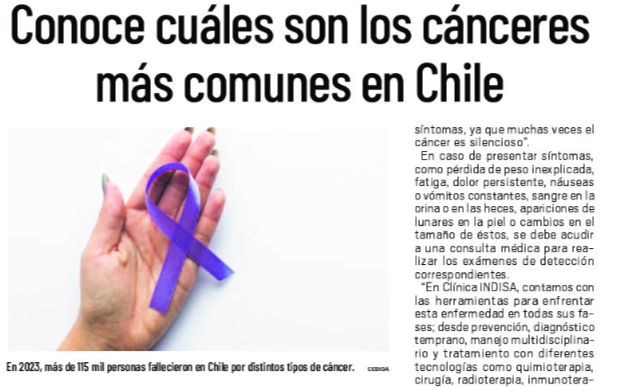Source: Diario El Día, February 5
For the past 25 years, World Cancer Day has been observed every February 4th, an initiative led by the Union for International Cancer Control (UICC) and the World Health Organization (WHO) to raise awareness and promote cancer prevention.
According to data from the National Institute of Statistics (INE), 115,429 cancer-related deaths were recorded in Chile in 2023, making it the second leading cause of death in the country, after circulatory system diseases. Marcelo Garrido, head of Oncology at Clínica INDISA, states that the most common types of cancer in Chile are prostate, gastrointestinal (colon and gastric), breast, and lung cancer.
Although cancer can be caused by genetic factors, the INDISA specialist highlights that lifestyle habits play a crucial role in its development and progression.
“External factors such as sun exposure, smoking, alcohol consumption, and an unhealthy diet can generate cancerous cells, especially in patients with a family history or pre-existing conditions” he emphasized.
Early Detection is Key
Early detection allows cancer to be identified in its initial stages, significantly improving the chances of successful treatment and reducing the risk of death.
“Regular screenings such as mammograms, colonoscopies, Pap tests, and other studies recommended based on age and family history are essential to detect cancer before it causes severe symptoms. Additionally, self-examinations, such as breast self-exams, are crucial tools for early diagnosis and risk reduction“ says the INDISA oncologist.
When Should You See a Doctor?
Dr. Marcelo Garrido advises that after the age of 40, people should undergo early cancer screening tests even if they do not have symptoms, as cancer is often silent.
If symptoms such as unexplained weight loss, fatigue, persistent pain, constant nausea or vomiting, blood in urine or stool, new or changing moles appear, it is important to seek medical consultation for the necessary screening tests.
“At Clínica INDISA, we have the tools to address this disease at all stages, from prevention and early diagnosis to multidisciplinary management and treatment using different technologies, including chemotherapy, surgery, radiotherapy, immunotherapy, molecular therapies, and even new treatments through clinical trials,” concludes Dr. Garrido.
To read the full article, follow this link:
http://www.impreso.diarioeldia.cl/papel-digital/diario-dia-05-02-2025
